PHI 208 - Workplace Ethics: Monitoring Employee Social Media Usage
VerifiedAdded on 2023/06/11
|7
|1903
|57
Essay
AI Summary
This essay delves into the ethical complexities surrounding the monitoring of employee social media usage during work hours. It addresses the central question of whether companies have a moral obligation to oversee employees' social media activities, considering the potential benefits and drawbacks for both the organization and the individual. The essay employs utilitarian and deontological ethical theories to analyze the issue, arguing that while unrestricted social media use can lead to decreased productivity, security breaches, and reputational damage, a complete ban is not the optimal solution. Instead, the paper advocates for a balanced approach involving clear policies, employee training, and the recognition of social media's potential for professional development and marketing. The analysis also considers objections to monitoring, emphasizing the importance of respecting employee privacy and autonomy while safeguarding the company's interests. Ultimately, the essay concludes that a well-regulated approach, guided by ethical principles and practical considerations, is essential for navigating the challenges of social media in the workplace.
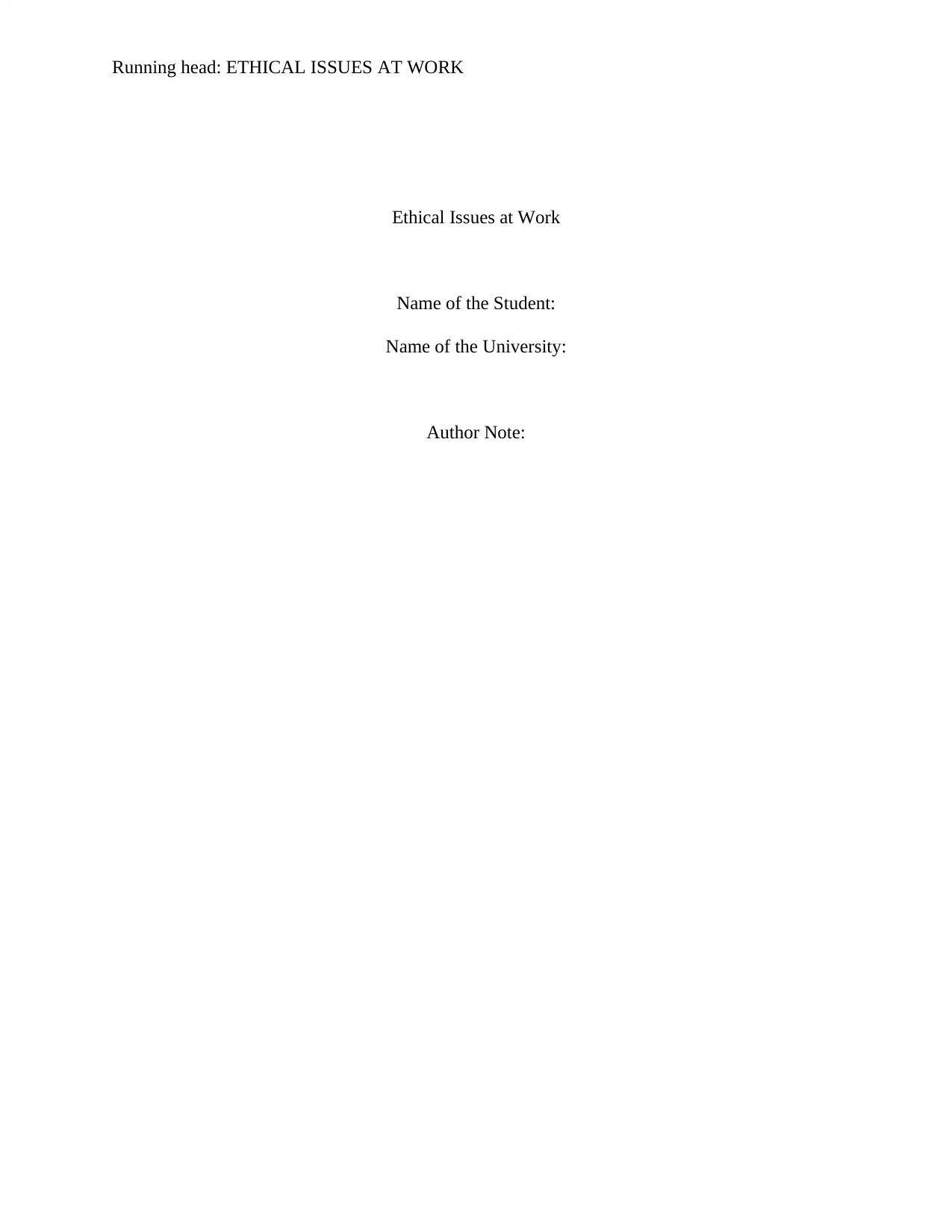
Running head: ETHICAL ISSUES AT WORK
Ethical Issues at Work
Name of the Student:
Name of the University:
Author Note:
Ethical Issues at Work
Name of the Student:
Name of the University:
Author Note:
Paraphrase This Document
Need a fresh take? Get an instant paraphrase of this document with our AI Paraphraser
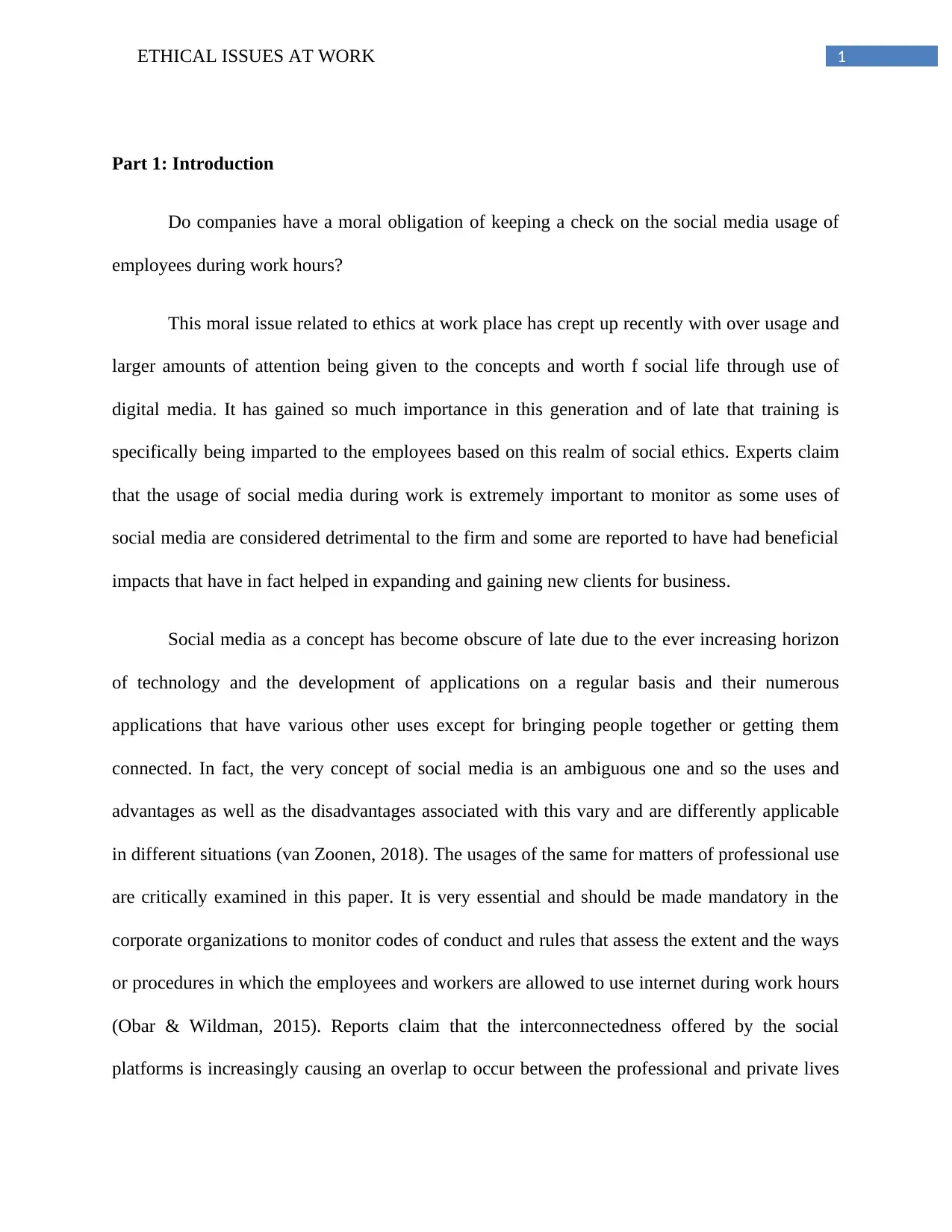
1ETHICAL ISSUES AT WORK
Part 1: Introduction
Do companies have a moral obligation of keeping a check on the social media usage of
employees during work hours?
This moral issue related to ethics at work place has crept up recently with over usage and
larger amounts of attention being given to the concepts and worth f social life through use of
digital media. It has gained so much importance in this generation and of late that training is
specifically being imparted to the employees based on this realm of social ethics. Experts claim
that the usage of social media during work is extremely important to monitor as some uses of
social media are considered detrimental to the firm and some are reported to have had beneficial
impacts that have in fact helped in expanding and gaining new clients for business.
Social media as a concept has become obscure of late due to the ever increasing horizon
of technology and the development of applications on a regular basis and their numerous
applications that have various other uses except for bringing people together or getting them
connected. In fact, the very concept of social media is an ambiguous one and so the uses and
advantages as well as the disadvantages associated with this vary and are differently applicable
in different situations (van Zoonen, 2018). The usages of the same for matters of professional use
are critically examined in this paper. It is very essential and should be made mandatory in the
corporate organizations to monitor codes of conduct and rules that assess the extent and the ways
or procedures in which the employees and workers are allowed to use internet during work hours
(Obar & Wildman, 2015). Reports claim that the interconnectedness offered by the social
platforms is increasingly causing an overlap to occur between the professional and private lives
Part 1: Introduction
Do companies have a moral obligation of keeping a check on the social media usage of
employees during work hours?
This moral issue related to ethics at work place has crept up recently with over usage and
larger amounts of attention being given to the concepts and worth f social life through use of
digital media. It has gained so much importance in this generation and of late that training is
specifically being imparted to the employees based on this realm of social ethics. Experts claim
that the usage of social media during work is extremely important to monitor as some uses of
social media are considered detrimental to the firm and some are reported to have had beneficial
impacts that have in fact helped in expanding and gaining new clients for business.
Social media as a concept has become obscure of late due to the ever increasing horizon
of technology and the development of applications on a regular basis and their numerous
applications that have various other uses except for bringing people together or getting them
connected. In fact, the very concept of social media is an ambiguous one and so the uses and
advantages as well as the disadvantages associated with this vary and are differently applicable
in different situations (van Zoonen, 2018). The usages of the same for matters of professional use
are critically examined in this paper. It is very essential and should be made mandatory in the
corporate organizations to monitor codes of conduct and rules that assess the extent and the ways
or procedures in which the employees and workers are allowed to use internet during work hours
(Obar & Wildman, 2015). Reports claim that the interconnectedness offered by the social
platforms is increasingly causing an overlap to occur between the professional and private lives
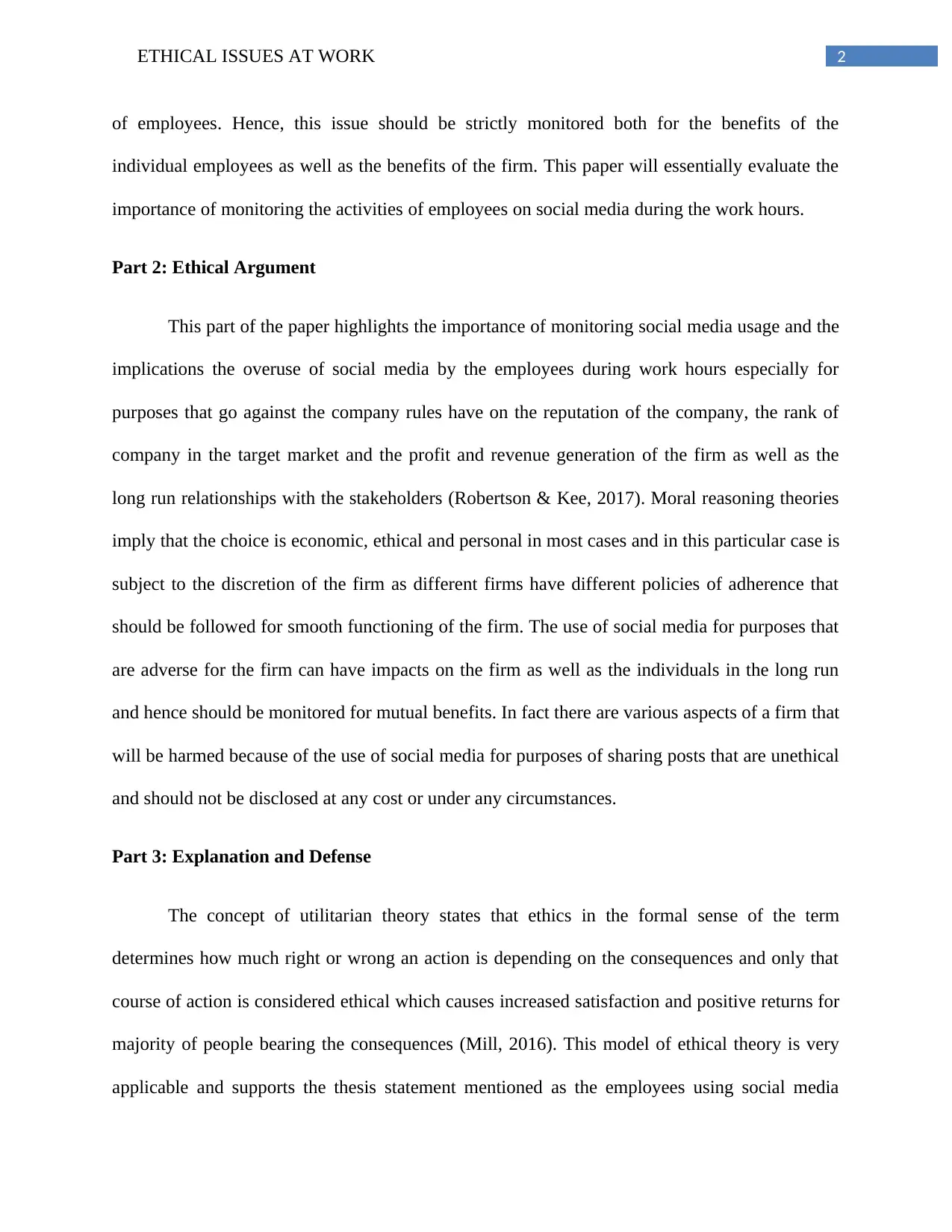
2ETHICAL ISSUES AT WORK
of employees. Hence, this issue should be strictly monitored both for the benefits of the
individual employees as well as the benefits of the firm. This paper will essentially evaluate the
importance of monitoring the activities of employees on social media during the work hours.
Part 2: Ethical Argument
This part of the paper highlights the importance of monitoring social media usage and the
implications the overuse of social media by the employees during work hours especially for
purposes that go against the company rules have on the reputation of the company, the rank of
company in the target market and the profit and revenue generation of the firm as well as the
long run relationships with the stakeholders (Robertson & Kee, 2017). Moral reasoning theories
imply that the choice is economic, ethical and personal in most cases and in this particular case is
subject to the discretion of the firm as different firms have different policies of adherence that
should be followed for smooth functioning of the firm. The use of social media for purposes that
are adverse for the firm can have impacts on the firm as well as the individuals in the long run
and hence should be monitored for mutual benefits. In fact there are various aspects of a firm that
will be harmed because of the use of social media for purposes of sharing posts that are unethical
and should not be disclosed at any cost or under any circumstances.
Part 3: Explanation and Defense
The concept of utilitarian theory states that ethics in the formal sense of the term
determines how much right or wrong an action is depending on the consequences and only that
course of action is considered ethical which causes increased satisfaction and positive returns for
majority of people bearing the consequences (Mill, 2016). This model of ethical theory is very
applicable and supports the thesis statement mentioned as the employees using social media
of employees. Hence, this issue should be strictly monitored both for the benefits of the
individual employees as well as the benefits of the firm. This paper will essentially evaluate the
importance of monitoring the activities of employees on social media during the work hours.
Part 2: Ethical Argument
This part of the paper highlights the importance of monitoring social media usage and the
implications the overuse of social media by the employees during work hours especially for
purposes that go against the company rules have on the reputation of the company, the rank of
company in the target market and the profit and revenue generation of the firm as well as the
long run relationships with the stakeholders (Robertson & Kee, 2017). Moral reasoning theories
imply that the choice is economic, ethical and personal in most cases and in this particular case is
subject to the discretion of the firm as different firms have different policies of adherence that
should be followed for smooth functioning of the firm. The use of social media for purposes that
are adverse for the firm can have impacts on the firm as well as the individuals in the long run
and hence should be monitored for mutual benefits. In fact there are various aspects of a firm that
will be harmed because of the use of social media for purposes of sharing posts that are unethical
and should not be disclosed at any cost or under any circumstances.
Part 3: Explanation and Defense
The concept of utilitarian theory states that ethics in the formal sense of the term
determines how much right or wrong an action is depending on the consequences and only that
course of action is considered ethical which causes increased satisfaction and positive returns for
majority of people bearing the consequences (Mill, 2016). This model of ethical theory is very
applicable and supports the thesis statement mentioned as the employees using social media
⊘ This is a preview!⊘
Do you want full access?
Subscribe today to unlock all pages.

Trusted by 1+ million students worldwide
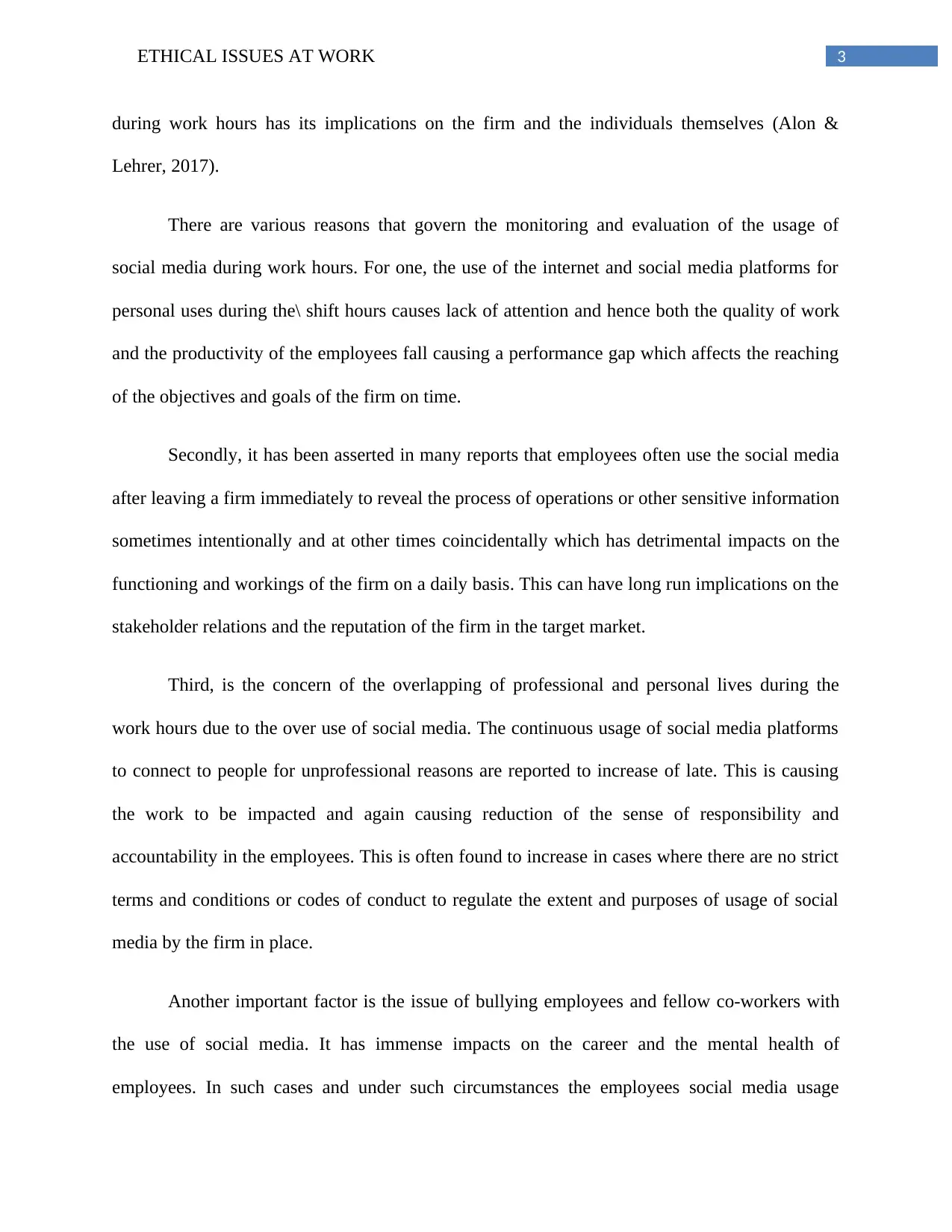
3ETHICAL ISSUES AT WORK
during work hours has its implications on the firm and the individuals themselves (Alon &
Lehrer, 2017).
There are various reasons that govern the monitoring and evaluation of the usage of
social media during work hours. For one, the use of the internet and social media platforms for
personal uses during the\ shift hours causes lack of attention and hence both the quality of work
and the productivity of the employees fall causing a performance gap which affects the reaching
of the objectives and goals of the firm on time.
Secondly, it has been asserted in many reports that employees often use the social media
after leaving a firm immediately to reveal the process of operations or other sensitive information
sometimes intentionally and at other times coincidentally which has detrimental impacts on the
functioning and workings of the firm on a daily basis. This can have long run implications on the
stakeholder relations and the reputation of the firm in the target market.
Third, is the concern of the overlapping of professional and personal lives during the
work hours due to the over use of social media. The continuous usage of social media platforms
to connect to people for unprofessional reasons are reported to increase of late. This is causing
the work to be impacted and again causing reduction of the sense of responsibility and
accountability in the employees. This is often found to increase in cases where there are no strict
terms and conditions or codes of conduct to regulate the extent and purposes of usage of social
media by the firm in place.
Another important factor is the issue of bullying employees and fellow co-workers with
the use of social media. It has immense impacts on the career and the mental health of
employees. In such cases and under such circumstances the employees social media usage
during work hours has its implications on the firm and the individuals themselves (Alon &
Lehrer, 2017).
There are various reasons that govern the monitoring and evaluation of the usage of
social media during work hours. For one, the use of the internet and social media platforms for
personal uses during the\ shift hours causes lack of attention and hence both the quality of work
and the productivity of the employees fall causing a performance gap which affects the reaching
of the objectives and goals of the firm on time.
Secondly, it has been asserted in many reports that employees often use the social media
after leaving a firm immediately to reveal the process of operations or other sensitive information
sometimes intentionally and at other times coincidentally which has detrimental impacts on the
functioning and workings of the firm on a daily basis. This can have long run implications on the
stakeholder relations and the reputation of the firm in the target market.
Third, is the concern of the overlapping of professional and personal lives during the
work hours due to the over use of social media. The continuous usage of social media platforms
to connect to people for unprofessional reasons are reported to increase of late. This is causing
the work to be impacted and again causing reduction of the sense of responsibility and
accountability in the employees. This is often found to increase in cases where there are no strict
terms and conditions or codes of conduct to regulate the extent and purposes of usage of social
media by the firm in place.
Another important factor is the issue of bullying employees and fellow co-workers with
the use of social media. It has immense impacts on the career and the mental health of
employees. In such cases and under such circumstances the employees social media usage
Paraphrase This Document
Need a fresh take? Get an instant paraphrase of this document with our AI Paraphraser
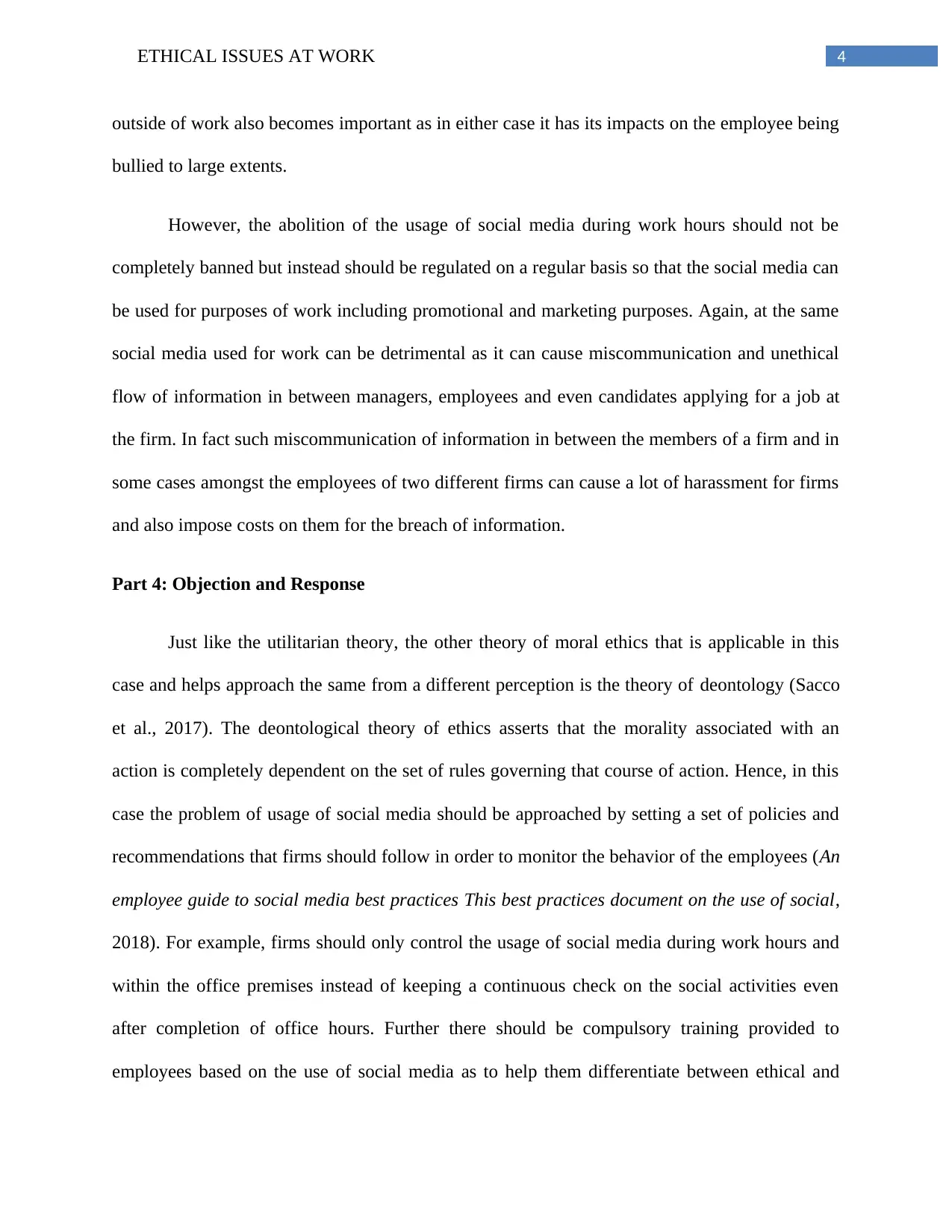
4ETHICAL ISSUES AT WORK
outside of work also becomes important as in either case it has its impacts on the employee being
bullied to large extents.
However, the abolition of the usage of social media during work hours should not be
completely banned but instead should be regulated on a regular basis so that the social media can
be used for purposes of work including promotional and marketing purposes. Again, at the same
social media used for work can be detrimental as it can cause miscommunication and unethical
flow of information in between managers, employees and even candidates applying for a job at
the firm. In fact such miscommunication of information in between the members of a firm and in
some cases amongst the employees of two different firms can cause a lot of harassment for firms
and also impose costs on them for the breach of information.
Part 4: Objection and Response
Just like the utilitarian theory, the other theory of moral ethics that is applicable in this
case and helps approach the same from a different perception is the theory of deontology (Sacco
et al., 2017). The deontological theory of ethics asserts that the morality associated with an
action is completely dependent on the set of rules governing that course of action. Hence, in this
case the problem of usage of social media should be approached by setting a set of policies and
recommendations that firms should follow in order to monitor the behavior of the employees (An
employee guide to social media best practices This best practices document on the use of social,
2018). For example, firms should only control the usage of social media during work hours and
within the office premises instead of keeping a continuous check on the social activities even
after completion of office hours. Further there should be compulsory training provided to
employees based on the use of social media as to help them differentiate between ethical and
outside of work also becomes important as in either case it has its impacts on the employee being
bullied to large extents.
However, the abolition of the usage of social media during work hours should not be
completely banned but instead should be regulated on a regular basis so that the social media can
be used for purposes of work including promotional and marketing purposes. Again, at the same
social media used for work can be detrimental as it can cause miscommunication and unethical
flow of information in between managers, employees and even candidates applying for a job at
the firm. In fact such miscommunication of information in between the members of a firm and in
some cases amongst the employees of two different firms can cause a lot of harassment for firms
and also impose costs on them for the breach of information.
Part 4: Objection and Response
Just like the utilitarian theory, the other theory of moral ethics that is applicable in this
case and helps approach the same from a different perception is the theory of deontology (Sacco
et al., 2017). The deontological theory of ethics asserts that the morality associated with an
action is completely dependent on the set of rules governing that course of action. Hence, in this
case the problem of usage of social media should be approached by setting a set of policies and
recommendations that firms should follow in order to monitor the behavior of the employees (An
employee guide to social media best practices This best practices document on the use of social,
2018). For example, firms should only control the usage of social media during work hours and
within the office premises instead of keeping a continuous check on the social activities even
after completion of office hours. Further there should be compulsory training provided to
employees based on the use of social media as to help them differentiate between ethical and
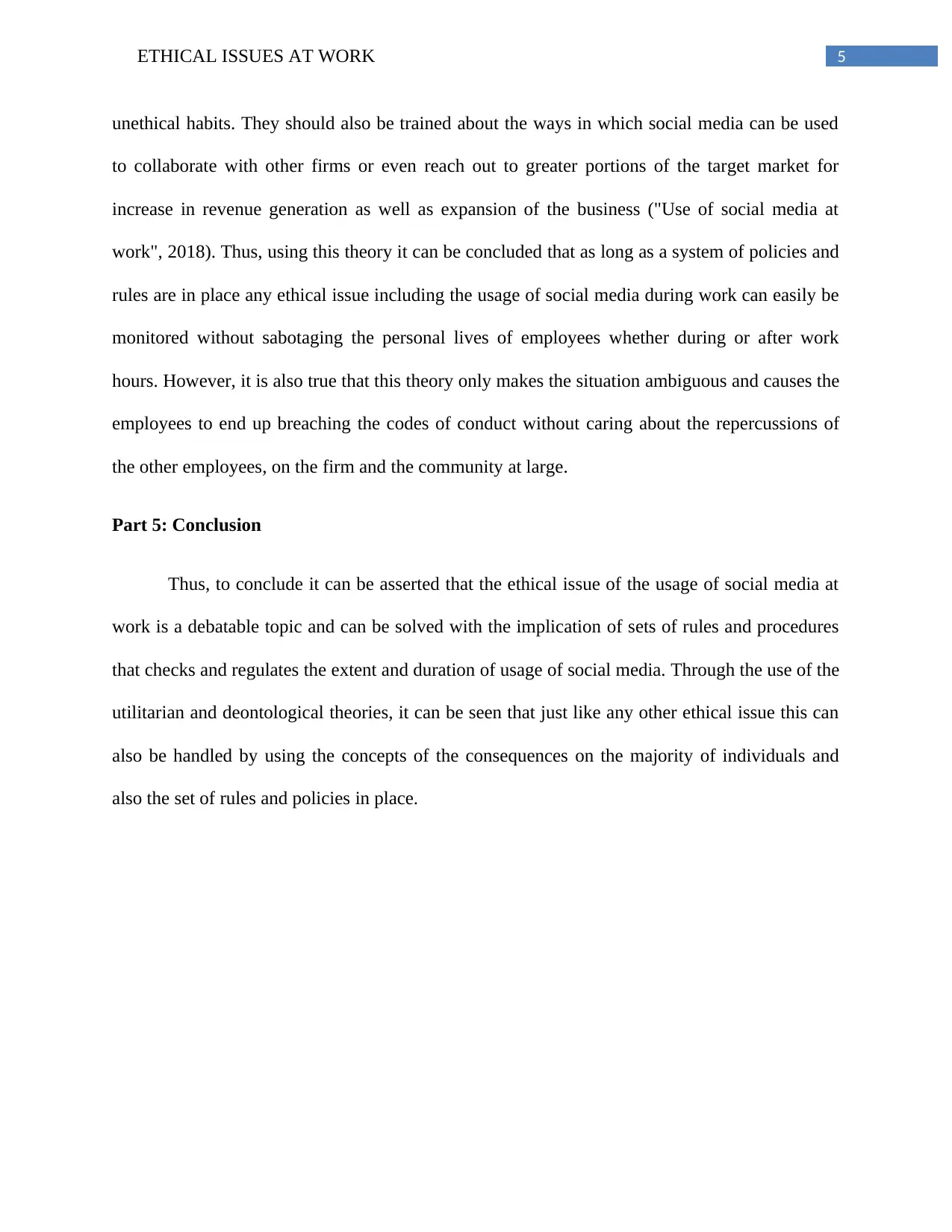
5ETHICAL ISSUES AT WORK
unethical habits. They should also be trained about the ways in which social media can be used
to collaborate with other firms or even reach out to greater portions of the target market for
increase in revenue generation as well as expansion of the business ("Use of social media at
work", 2018). Thus, using this theory it can be concluded that as long as a system of policies and
rules are in place any ethical issue including the usage of social media during work can easily be
monitored without sabotaging the personal lives of employees whether during or after work
hours. However, it is also true that this theory only makes the situation ambiguous and causes the
employees to end up breaching the codes of conduct without caring about the repercussions of
the other employees, on the firm and the community at large.
Part 5: Conclusion
Thus, to conclude it can be asserted that the ethical issue of the usage of social media at
work is a debatable topic and can be solved with the implication of sets of rules and procedures
that checks and regulates the extent and duration of usage of social media. Through the use of the
utilitarian and deontological theories, it can be seen that just like any other ethical issue this can
also be handled by using the concepts of the consequences on the majority of individuals and
also the set of rules and policies in place.
unethical habits. They should also be trained about the ways in which social media can be used
to collaborate with other firms or even reach out to greater portions of the target market for
increase in revenue generation as well as expansion of the business ("Use of social media at
work", 2018). Thus, using this theory it can be concluded that as long as a system of policies and
rules are in place any ethical issue including the usage of social media during work can easily be
monitored without sabotaging the personal lives of employees whether during or after work
hours. However, it is also true that this theory only makes the situation ambiguous and causes the
employees to end up breaching the codes of conduct without caring about the repercussions of
the other employees, on the firm and the community at large.
Part 5: Conclusion
Thus, to conclude it can be asserted that the ethical issue of the usage of social media at
work is a debatable topic and can be solved with the implication of sets of rules and procedures
that checks and regulates the extent and duration of usage of social media. Through the use of the
utilitarian and deontological theories, it can be seen that just like any other ethical issue this can
also be handled by using the concepts of the consequences on the majority of individuals and
also the set of rules and policies in place.
⊘ This is a preview!⊘
Do you want full access?
Subscribe today to unlock all pages.

Trusted by 1+ million students worldwide
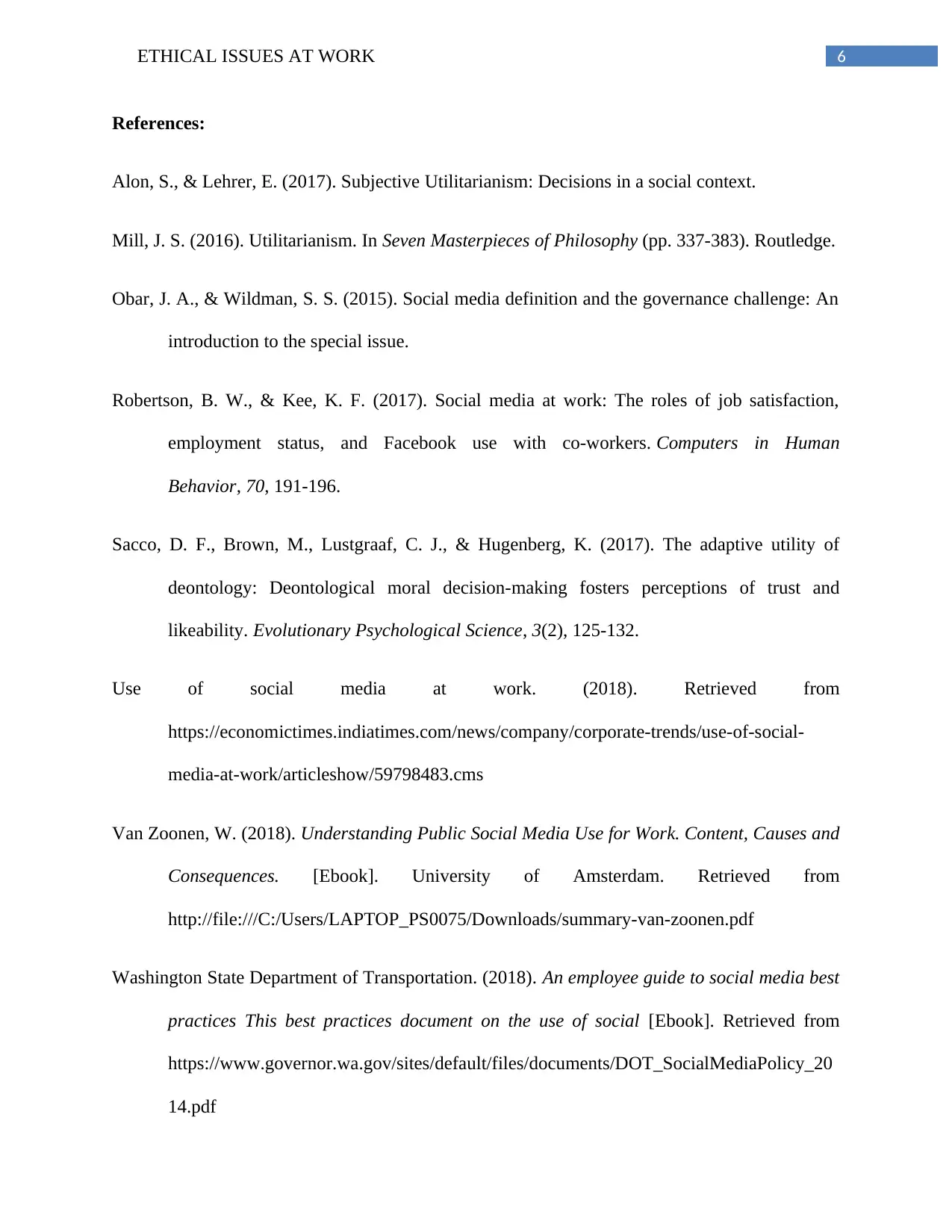
6ETHICAL ISSUES AT WORK
References:
Alon, S., & Lehrer, E. (2017). Subjective Utilitarianism: Decisions in a social context.
Mill, J. S. (2016). Utilitarianism. In Seven Masterpieces of Philosophy (pp. 337-383). Routledge.
Obar, J. A., & Wildman, S. S. (2015). Social media definition and the governance challenge: An
introduction to the special issue.
Robertson, B. W., & Kee, K. F. (2017). Social media at work: The roles of job satisfaction,
employment status, and Facebook use with co-workers. Computers in Human
Behavior, 70, 191-196.
Sacco, D. F., Brown, M., Lustgraaf, C. J., & Hugenberg, K. (2017). The adaptive utility of
deontology: Deontological moral decision-making fosters perceptions of trust and
likeability. Evolutionary Psychological Science, 3(2), 125-132.
Use of social media at work. (2018). Retrieved from
https://economictimes.indiatimes.com/news/company/corporate-trends/use-of-social-
media-at-work/articleshow/59798483.cms
Van Zoonen, W. (2018). Understanding Public Social Media Use for Work. Content, Causes and
Consequences. [Ebook]. University of Amsterdam. Retrieved from
http://file:///C:/Users/LAPTOP_PS0075/Downloads/summary-van-zoonen.pdf
Washington State Department of Transportation. (2018). An employee guide to social media best
practices This best practices document on the use of social [Ebook]. Retrieved from
https://www.governor.wa.gov/sites/default/files/documents/DOT_SocialMediaPolicy_20
14.pdf
References:
Alon, S., & Lehrer, E. (2017). Subjective Utilitarianism: Decisions in a social context.
Mill, J. S. (2016). Utilitarianism. In Seven Masterpieces of Philosophy (pp. 337-383). Routledge.
Obar, J. A., & Wildman, S. S. (2015). Social media definition and the governance challenge: An
introduction to the special issue.
Robertson, B. W., & Kee, K. F. (2017). Social media at work: The roles of job satisfaction,
employment status, and Facebook use with co-workers. Computers in Human
Behavior, 70, 191-196.
Sacco, D. F., Brown, M., Lustgraaf, C. J., & Hugenberg, K. (2017). The adaptive utility of
deontology: Deontological moral decision-making fosters perceptions of trust and
likeability. Evolutionary Psychological Science, 3(2), 125-132.
Use of social media at work. (2018). Retrieved from
https://economictimes.indiatimes.com/news/company/corporate-trends/use-of-social-
media-at-work/articleshow/59798483.cms
Van Zoonen, W. (2018). Understanding Public Social Media Use for Work. Content, Causes and
Consequences. [Ebook]. University of Amsterdam. Retrieved from
http://file:///C:/Users/LAPTOP_PS0075/Downloads/summary-van-zoonen.pdf
Washington State Department of Transportation. (2018). An employee guide to social media best
practices This best practices document on the use of social [Ebook]. Retrieved from
https://www.governor.wa.gov/sites/default/files/documents/DOT_SocialMediaPolicy_20
14.pdf
1 out of 7
Related Documents
Your All-in-One AI-Powered Toolkit for Academic Success.
+13062052269
info@desklib.com
Available 24*7 on WhatsApp / Email
![[object Object]](/_next/static/media/star-bottom.7253800d.svg)
Unlock your academic potential
Copyright © 2020–2026 A2Z Services. All Rights Reserved. Developed and managed by ZUCOL.





